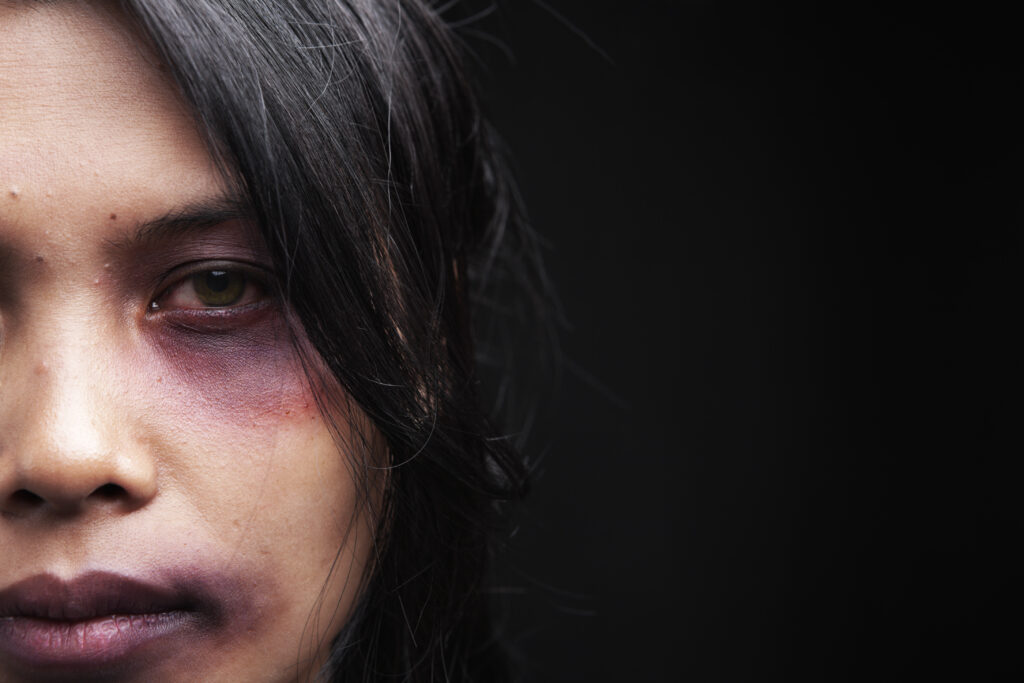The Underlying Factors: An Islamic Perspective

By M. Basheer Ahmed
January/February 2023
Intimate spouse violence (IPV) affects the lives of millions of women, children, families, and societies worldwide.
In the Islamic context, intimate spouses refer only to a husband and a wife. Despite serious attempts to educate and help both the abusers and the abused, IPV prevalence rates are rising. Data suggest that the pandemic and its associated lockdowns might have led to further increases.
There is comparatively little information available on IPV’s prevalence among Muslims. Physical IPV is reported to be approximately 30-55% in Jordan, Saudi Arabia, Pakistan, Iran, and Bangladesh. Many Muslims living in the West also experience it.
Quranic teachings state that all human beings — without exception — are equal, that men and women are spouses and that no one has a level of authority over others. The most righteous person is the most honored in God’s sight (9:71). The marital relationship is described as one of tranquility, kindness, mutual love and affection, respect, caring and mercy, “O believers, treat women with kindness even if you dislike them; it is quite possible that you dislike something which God might yet make a source of abundant good” (4:19). Prophet Muhammad (salla Allahu ‘alayhi wa sallam) said, “The perfect believer is one who is the best in courtesy and amiable manners, and the best among you people is one who is most kind and courteous to his wives.”
The Psychodynamics of Perpetrators
No single theory explains why men show such aggressive behavior. Abusers present psychopathological traits that could cause them to unleash violence on their spouse. Holzworth-Munroe and Stuart identified three types of abusers:
• Family-only abusers are described as less deviant on impulsivity, alcohol and drug abuse, criminal and other behaviors. They show poor social and communication skills, are dependent on their spouse and have a history of abuse in the family. Their relationships tend to be relatively stable, and they show higher levels of post-assault remorse.
• Borderline/dysphoric abusers tend to get involved in moderate violence and show impulsive behavior, anger and jealousy. They show a hostile attitude toward women and low levels of post-violence remorse (DOI:10.1037/0033-2909.116.3.476).
Most studies on the psychopathology of male domestic abusers have focused on personality disorders. People showing these disorders often have dysfunctional social relationships and don’t seek help unless the court orders them to do so. The commonly identified personality disorders are borderline, narcissistic, antisocial, and paranoid. About 25% of abusers may have depressive disorders. While these personality traits may not cause violent behavior, they may show resistance to the psychotherapeutic approach. One study found that head injuries were significantly associated with domestic abuse (DOI: 10.3109/00207450108994235).
Abusive behavior is most likely learned at home. If abusers grew up in environments where abuse was common, domestic violence may be passed down to children as a standard of behavior to be expected in intimate relationships. Boys may become violent adults, and girls may not identify violence as abusive, but accept it as normal adult relationship behavior (Jaffe P. & Suderman, M., Child Witness of Woman Abuse, in Stith S. and Strauss M., eds., Understanding Partner Violence,” 1995).
Most abusers feel an inner satisfaction from having total control over their spouse by humiliating her persistently. Similarly, the spouse learns to submit, which reinforces the abuser’s violent behavior and lets the cycle of violence continue. This attempted accommodation reinforces the abuser’s aggressive behavior and renders it more frequent and intense. Many women remain silent or do not report it to the authorities, considering it a private family matter. The lack of consequences only encourages the abuser to continue.
Abusers often justify their behavior and minimize its seriousness by blaming their wives for instigating it, which reinforces their belief that force is the only option: “She made me hit her.” They avoid guilt or shame and minimize their personal responsibility by saying, “It happens in every marriage,” and often dehumanize her by saying, “She deserved it.” Denial is the abuser’s most common defense mechanism. Some abusers even blame the victim, saying, “She self-inflected the injuries” (Ordoxa T., “Understanding Domestic Violence,” Iowa Medicine, Jan. 1995).
Abusive men come from a variety of backgrounds, religions, races, and occupations. Rigid sex role stereotypes are pervasive, as abusive men attempt to place their spouses in a submissive role. Their belief that they have the right to control the wife’s behaviors may be reinforced by the religious belief that she should be obedient and subservient.
There is a sharp divide between traditional interpretations of 4:34, which stress female obedience and male authority, and contemporary interpretations, which emphasize the financial component of men’s marital duties and limits a husband’s power over his wife.
Most often abusers justify their behavior by quoting religious teachings, saying they’re the head of the household and the wife must submit. In public, many of them appear to be “gentlemen.” They come to religious institutions and show generosity, believe they have a good knowledge of the Sharia, often keep a good public appearance, may have a stable work record, are good providers and appear to be caring family men — all of which give a false perception to the community members. Most abusers lack insight into their problems.
Common Anger vs. Power, Control and Abuse
Arguments occur at some point between all spouses over childcare, housework, financial and other matters. Domestic violence, however, differs from routine arguments and expressing one’s anger. Similarly, in certain cultures women are encouraged to stay home, walk behind their husbands and forbidden to drive. These examples of inequality and oppression shouldn’t be confused or equated with domestic violence, for the latter employs a complex verbal and/or physically aggressive pattern of behavior to control the victim, such as constant criticism, verbal abuse, threats, throwing objects, kicking, punching, and even stabbing.
The abusive and violent behavior continues and becomes more pronounced when the victim attempts to leave. IPV revolves around controlling another person. The spouse’s departure further enrages the perpetrator, who tends to show extreme violence and uncontrollable behavior. When such a person loses control, he may try to kill his wife because “If I can’t have her, no one can.” This possible fate increases significantly after she leaves.
Unfortunately, despite Islamic teachings of compassion, justice, and kindness, many Muslimas experience these tragedies. Domestic violence does not end until outside intervention takes place.
Raising Non-Abusive Children
During the last four decades, many religious and cultural organizations have sought to eradicate this menace. They have been successful in Tertiary Prevention, focusing on post-violence victims to deal with its consequences and offender treatment interventions. And yet IPV’s incidence and prevalence has increased because primary prevention efforts were not made to change those sociocultural norms that allow and condone violence.
Change will occur only by changing the relevant attitudes, beliefs and behaviors and promoting those that stop them. We need to promote a culture in which all relationships are built on respect, dignity, equality, and peace.
Islam categorically forbids violence against women for any reason. Verses 2:229-37, 4:19 and 4:25 proclaim that male-female relationship is to be one of kindness, mutual respect and caring. And yet the abusive behavior continues.
Education, the Best Preventive Measure
Reducing or eradicating domestic violence depends upon starting educational programs in all mosques, Islamic schools, and social organizations. These should be regular programs, not the result of some incident reported by the media. They must be tailored for men and women aged 6-13, 13-18 and adults 18 and above and cover Islamic teachings of gender equality, respect, and dignity; establishing a home environment of love, caring and mutual understanding; how disagreements develop and should be resolved; and how to make decisions on financial matters, child-rearing, and other issues via mutual consultation.
Childhood experiences are the major influencing factors for abuse and violence. As students 13 years and older have achieved a cognitive understanding of social and sexual issues, this is the right age to discuss these issues in joint classes. As such, they must develop an understanding of aggressive behavior and its consequences on self, family, and community; learn healthy ways to develop interpersonal relations; learn how to express their feelings, communication skills and power sharing; and be aware of attitudes that promote violence.
All Quranic verses supporting gender equality, respect and love must be emphasized at an early age if we hope to eradicate IPV.
Maintaining relationships requires discipline, which isn’t the same as forcing one’s spouse into submission. Instead, it means that both spouses must tolerate each other’s imperfections, thereby resisting the temptation to engage in behavior that leads to IPV. Another major issue is the lack of effective communication skills. In my practice, I found this to be the major reason why people turn to abuse and violence to resolve conflicts. Both spouses need to adhere to Islam’s teachings that promote love, peace, kindness, and gender equality.
Sometimes it may be necessary to confide in family members, friends, and colleagues. Many professionals can also help improve an abusive relationship. But if there is no improvement and if the spouses aren’t compatible, it may be more practical to get a divorce.
In sum: The head of the family has no right to abuse his wife emotionally, verbally, or physically. This is a crime, and there are legal consequences.
Dr. Basheer Ahmed, a former professor of psychiatry at Southwestern Medical School, Dallas, is chairman emeritus at the Muslim Community Center for Human Services, Dallas.
Tell us what you thought by joining our Facebook community. You can also send comments and story pitches to [email protected]. Islamic Horizons does not publish unsolicited material.
